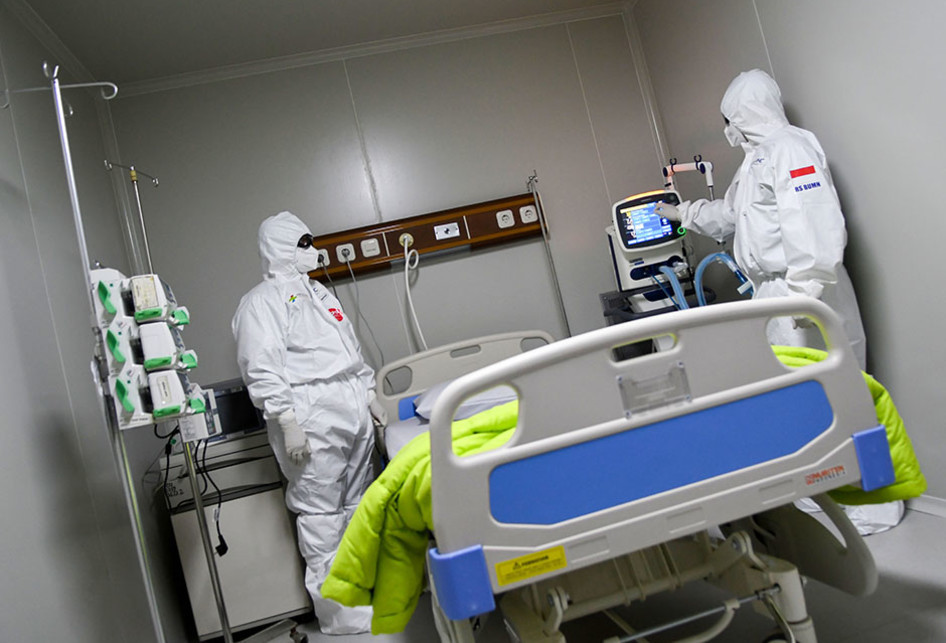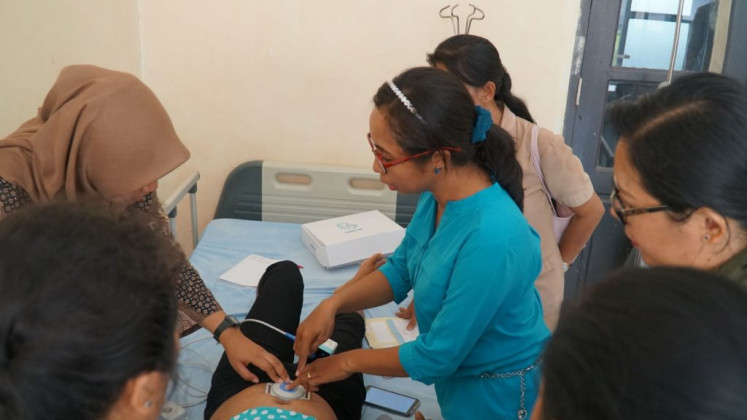Popular Reads
Top Results
Can't find what you're looking for?
View all search resultsPopular Reads
Top Results
Can't find what you're looking for?
View all search resultsCOVID-19: A wake-up call for national industry
Indonesia’s plight in acquiring test kits and ventilators should not have occurred according to the globalization orthodoxy that holds we can easily import anything in the borderless world.
Change text size
Gift Premium Articles
to Anyone
N
otwithstanding the heated discourse on how Indonesia should curb the COVID-19 outbreak, everyone concurs that one of the most daunting challenges we face is a severe lack of testing. Indonesia has only carried out 0.17 test per 1,000 people. That figure is lower than that of our neighbors including Malaysia (3.29), Vietnam (1.6) and Thailand (0.6).
This unacceptably low rate is due to the fact that we are overly reliant on imported testing kits, particularly polymerase chain reaction (PCR) reagents. Skyrocketing global demand and export restrictions imposed by some countries make it more difficult for us to import critical supply. In addition to testing kits, we also depend heavily on the import of ventilators, which will be increasingly important as the virus continues to spread.
Indonesia’s plight in acquiring test kits and ventilators should not have occurred according to the globalization orthodoxy that holds we can easily import anything in the borderless world. After all, the sacrosanct dogma of globalization is comparative advantage, the notion that countries should only produce what they are relatively most efficient at and import what they are not.
Accordingly, the traditional prescription holds, Indonesia should not delude itself and attempt to produce more advanced products. We should just stick to producing what we are good at, such as palm oil, and we should import more sophisticated products such as ventilators.
Some are skeptical of this doctrine because many fast-growing economies, such as the East Asian juggernauts, did not conform to this laissez-faire zeal when they were catching up. They, instead, resorted to various heretical industrial policies.
The crisis has demonstrated that overreliance on foreign imports and weak domestic productive capacity do not only create an economic predicament, they can be a matter of life and death.
So what does this all mean? First, we should distinguish between short term and long term reforms. In the short run, with our limited industrial capacity, there is not much wiggle room for changes. In order to meet our emergency supply needs we have to try to import the test kits and ventilators from abroad.
However, in the medium to long run, we cannot sustain a status quo that perpetuates excessive reliance on imports, even when it comes to strategic supply.
First, we should earnestly set the revival of our domestic industrial capacity as an utmost national priority. We have grand plans such as “Making Indonesia 4.0”, but we continue to suffer from premature deindustrialization as the share of manufacturing in our economy shrinks to less than 20 percent. This has to change.
In revitalizing our nation’s industry, we have two parallel paths: the foreign investment and the domestic firm tracks. On the first track, we need to attract the right kind of investments, and doing so may necessitate flouting some conventional norms.
We should consider unorthodox measures such as local content requirements that would compel foreign advanced companies not only to invest in Indonesia but also to strengthen the capacity of our domestic firms by building domestic linkages.
China extensively utilized this policy in the past by leveraging the size of its market. We should consider doing the same thing. If major companies want to tap into Indonesia’s behemoth consumer market, then they can do so by raising our domestic firms’ productivity.
While on the first track we should learn from China, on the second one we should heed the lessons of South Korea and Taiwan, which grew rapidly by supporting and protecting their own domestic firms. Indonesia can explore this track, especially considering that we have several productive firms with vast potential. For instance, we have Bio Farma, which with the right support can help us weather subsequent pandemics.
To this end, we can capitalize on our planned sovereign wealth fund, which has attracted billions of dollars of commitments from various corners. Instead of merely financing our infrastructure projects, such as the construction of our new capital city, we should also harness the fund as a “smart” development bank that can offer favorable long-term lending for the strategic expansion of our firms. The fund can also invest in new start-ups that attempt to employ new technology.
The government may not be able to unilaterally “pick winners”. Thus, the government must collaborate with the private sector to identify strategic sectors that warrant greater support and also to rectify some possible policy failures. In 2018, the government announced a plan to establish a national industrial committee (KINAS) as a public-private platform on policy deliberation. We need to operationalize this plan.
The COVID-19 pandemic is devastating, but at least it offers a wake-up call on how the status quo is untenable. We were caught off guard by this pandemic, but if we have stronger productive capacity when another crisis strikes, we will be better equipped to aid our distressed compatriots instead of being entirely dependent on help from abroad.
______
Master in Public Policy candidate at Harvard Kennedy School with a focus on trade and industrial policy










